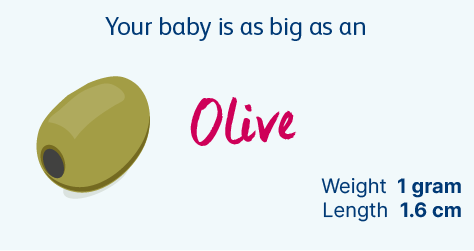What's happening in week 8 of your pregnancy
Two months into your pregnancy and you are no doubt now feeling lots of changes.
At a glance
- Your baby is around two centimetres long now and has a recognisable body outline
- Your womb is already be twice its normal size!
- Their skin is still paper thin, almost transparent

How big is my baby at 8 weeks pregnant?
Your baby is around 1.6 centimetres long now – still minuscule, but growing and developing every day. Eight weeks is often a time of a growth spurt and your fetus can double in size this week. Their tiny little fingers and toes will have formed, and the bones of their face are forming. Their heart will be beating an amazing 160 beats a minute! Their skin is still paper thin, and it still has that almost transparent, embryonic look.
The colour pigment in their eyes is also starting to form at around eight weeks, but they won't properly open them until around
26 weeks.
Did you know?
- Your baby's little fingers and toes are starting to change from being titchy buds into actual digits
- Your baby is almost 2 centimetres long and about the size of an olive
- Your baby's diaphragm which will enable your baby to breathe and hiccup is developing now
- Until 20 weeks your baby is measured from the top of the head to the bottom of the buttocks
You at 8 weeks pregnant
You should have made contact with your midwife by now. Eight weeks in and although you won't have a visible bump yet, your womb is already be twice its normal size! You might find this causes you to wee more often as it presses down on your bladder – get used to it, it's going to get a lot bigger yet!
You no doubt have your booking appointment in place now, and might be thinking about all the things you want to talk to the midwife about, such as antenatal screening tests.
You're probably still feeling pretty exhausted at this point, too, and needing your rest and plenty of sleep. Go for it! Don't try and fight it if you are worn out.
If your
morning sickness is still making getting up and about difficult in the morning.
Likely due to rising hormone levels, regular morning sickness usually settles down by 12-14 weeks and by around 16-20 weeks it should have gone away altogether.
But if you can’t keep any food or drink down and are worried at all about the severity of your pregnancy sickness, see your midwife or doctor.
Other than severe sickness and nausea you may notice:
- Darker than usual urine
- Weeing less often
- Feeling dizzy or faint
- Higher than normal temperature
- Weight loss
- Feeling dehydrated
Doctors can prescribe anti-sickness drugs (anti-emetics) and steroids and you may also be prescribed a vitamin B supplement.
Did you know?
- To prepare your body for birth, you produce a hormone called relaxin which softens your joint ligaments
- Only 7 % of women get cravings
- Pregnant women should avoid contact with ewes and newborn lambs
What to think about in week 8 of pregnancy
You are probably already really curious as to whether your little baby is a boy or a girl! It's up to you and your partner to decide whether or not you find out the sex of your baby at your later scans - some parents-to-be like to know for practical purposes - what colour to decorate the nursery, or to help narrow down name lists - but others prefer to have a surprise on the day. Do bear in mind though, not all hospitals will tell you, although you could consider a private scan should you be desperate to find out! So what will you do? Find out in advance, or discover for yourself on d-day?
Signs and symptoms at 8 weeks pregnant
Vaginal discharge
Vaginal discharge is sensitive to hormonal changes, which is why it increases during pregnancy and around the time of ovulation.
Normal vaginal discharge in pregnancy - medically known as Leukorrhoea - is a mild-smelling, clear or white, thin milky fluid that comes from your cervix and keeps your vagina clean. The reason there’s more of it during pregnancy is because more blood is flowing to the area. During pregnancy the neck of the womb and vaginal walls gets softer, and discharge increases so that possible infections can be prevented from travelling up the vagina to the womb. You should take yourself to the GP if you notice any significant change to your vaginal discharge, as it can be hard to make a specific diagnosis otherwise. There's absolutely no need for embarrassment, and your GP will see many cases of vaginal discharge in the course of everyday consultations, so do say if you notice that the discharge is coloured, or smells strange or if you feel itchy or sore.
Smells make you heave
Some women only notice a slight change in their sense of smell, while others find certain scents become quite overwhelming – fortunately most find this returns to normal once the baby arrives.
In some cases, women have really strong negative reactions to odours like cigarettes, alcohol or caffeine - which could be your body’s way of saying ‘no thanks’ to these products so that the baby is kept safe from the harm that they could cause. It’s scientifically proven that the estrogen you produce during your pregnancy directly heightens your ‘olfactory system’ which in simple terms means your sense of smell will be affected in many and sometimes surprising ways throughout your pregnancy.
Watch our video below on: The first scan (12 weeks)
Video: What should I do if I start bleeding during early pregnancy?
